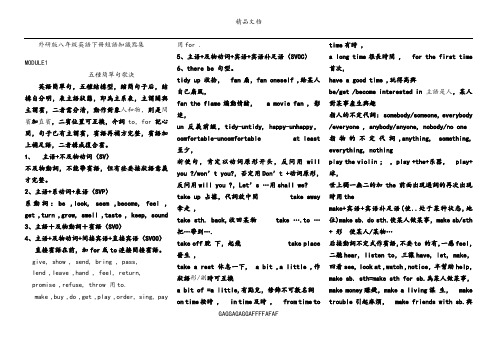2020八年级下册英语期末语法知识复习课件外研版
八年级下英语(外研版)全部知识点总复习

外研版八年級英語下冊短語知識點集MODULE1五種簡單句歌決英語簡單句,五種結構型,縮簡句子后,結構自分明,表主語狀態,即為主系表,主謂關與主謂賓,二者需分清,動作對象人和物,則是間賓加直賓,二賓位置可互換,介詞to,for記心間,句子已有主謂賓,賓語再補方完整,賓語加上補足語,二者構成復合賓。
1、主语+不及物动词(SV)不及物動詞,不能帶賓語,但有些要接狀語意義才完整。
2、主语+系动词+表语(SVP)系動詞:be ,look, seem ,become, feel , get ,turn ,grow, smell ,taste , keep, sound3、主語+及物動詞+賓語(SVO)4、主语+及物动词+间接宾语+直接宾语(SVOO)直接賓語在前,加for或to連接間接賓語。
give, show , send, bring , pass,lend ,leave ,hand , feel, return,promise ,refuse, throw 用to.make ,buy ,do ,get ,play ,order, sing, pay 用for .5、主语+及物动词+宾语+宾语补足语(SVOC)6、there be 句型。
tidy up 收拾, fan扇,fan oneself ,給某人自己扇風,fan the flame煽動情緒, a movie fan , 影迷,un反義前綴,tidy-untidy, happy-unhappy,comfortable-uncomfortable at least至少,祈使句,肯定以动词原形开头,反问用willyou ?/won’t you?,否定用Don’t +动词原形,反问用will you ?,Let’s …用shall we?take up占據,代詞放中間 take away拿走 ,take sth. back,收回某物 take ….to …把…帶到….take off脫下,起飛 take place發生 ,take a rest 休息一下, a bit ,a little ,作狀語形/副時可互換a bit of =a little,有點兒,修飾不可數名詞on time按時 , in time及時 , from time totime有時 ,a long time很長時間 , for the first time首次,have a good time ,玩得高興be/get /become interested in 主語是人,某人對某事產生興趣指人的不定代詞: somebody/someone, everybody/everyone , anybody/anyone, nobody/no one指物的不定代詞,anything, something,everything, nothingplay the violin ; ,play +the+乐器, play+球,世上獨一無二的加the前面出現過詞的再次出現時用themake+宾语+宾语补足语(使..处于某种状态,地位)make sb. do sth.使某人做某事,make sb/sth+ 形使某人/某物…后接動詞不定式作賓語,不要to 的有,一感feel,二聽hear, listen to,三讓have, let, make,四看see, look at ,watch ,notice,半幫助help,make sb. sth=make sth for sb.為某人做某事,make money賺錢,make a living謀生, maketrouble引起麻煩, make friends with sb.與GAGGAGAGGAFFFFAFAF某人交朋友, make war 開戰, make a fire 生火, make a face做鬼臉,make ..from用..制成(用被動) be made of 用..制成(用被動) make fun of 取笑,與…開玩笑, make room for 為…讓地方, make up 編造, make up one’s mind 決心,拿定主意,現在完成時:表過去發生或已經完成的某一動作,對現在造成的影響和結果,或持續到現在的動作。
新外研版英语八年级下册知识点复习(共50张PPT)

No, I don’t. No, they weren’t. 5) The days get long. I can help you ___ I have time. I usually have eggs for breakfast. He said, “You are younger than I ”.
7. _A__ft_e_r_ getting up, I always listen to the radio for a while. 8. We must be quick, _o_r_ we can’t follow them. 9. To catch the early bus, _s_o_ I got up very early this morning.
collecting stamps/model cars.
回答爱好:
My hobby is
writing. playing basketball.
swimming. running. singing.
5. 提问人的相貌:
What does...look like?
6. 提问人的性格:
What is ... like?
Have you...? Yes, I have . No. I haven’t.
Were they...? Yes, they were. No, they weren’t.
Was he...? Yes, he was. No, he wasn’t.
Has she …? Yes, she has. No, she hasn’t.
四、句型 (及交际用语)
1.对某人来说做某事是怎么样的:
新外研版八年级英语下册初二期末复习课件全套

温馨提示: called 也可换为 named。
外研版 八年级英语下册复习课件
八年级(下) Modules 1~2
☞词汇拓展 1. soft(adj.) →hard (反义词 adj.)硬的 2. love(n.&v.) →lovely (adj.)令人愉快的;可爱的 3. do(v.)→done (adj.)做完的 4. salt(n.)→salty (adj.)咸的 5. favour(v.&n.)→favourite (n.) 最喜欢的人或事 →favourite (adj.)最喜爱的
6. fair(adj.)→unfair (反义词 adj.)不公平的 7. pretty(adj.) →pretty (adv.)相当 8. compete(v.)→competition (n.)比赛;竞争 9. invite(v.) →invitation (n.)邀请 10. mix(v.) →mixture (n.)混合物 11. miss(v.) →Miss (n.)小姐 →missing (adj.)找不到的;失踪的
I don't know how to do it. 我不知道如何做它。
【归纳拓展】 疑问代词或副词 what,who,which, when,how 等后面也可接动词不定式(短语),在句中作动 词 know,tell,teach 等的宾语。
I don't know what to do next. 我不知道下一步该做什么。 We don't know when to start. 我们不知道何时开始。
外研版八年级英语下册总复习精华课件(共395张PPT)

31.成绩不好 32.感觉有点伤心 33.起初,开始 34.感到紧张 35.和陌生人一起 36.几天以后 37.用正确的方式 38.害怕坐飞机
31.get bad marks 32.feel a bit sad 33.at first 34.feel nervous 35.be with strangers 36.in a few days 37.in the right way 38.be afraid of flying
What is sb like? 某人的性格怎么样?
1. 8. It’s+adj. for(of)sb to do sth.
Module 1 Feelings and impressionsUnit 1
1. What a delicious smell? Smell:一股气味 (可数名词)
_____ good advice! It’s so helpful to us. (what / How)
害怕……
3. thanks for dong sth
感谢某人做…
thank sb for sth
因……感谢某人
4. can’t wait to do sth
迫不及待做某事
5. spend 时间/金钱+(in)doing sth某人做…….花……
spend 时间、金钱+on sth.
某人花…在某方面
6.be proud of…
25.wear glasses
26.找到对方
26.find each other
27.听起来像
27.sound like
28.还有,也
28.as well
29.为...感到自豪 29.be proud of/take pride in
外研版英语八年级下册全册复习课件

根据句意和首字母提示完成单词: 1.The pizza looks so nice and s_________ very delicious. mells 2.The milk smells s_________. You can't drink it. 3.Making an apple p________ is very easy. our I don't like it. 4.The soup is s_________ and 5.Skating is quite interesting. ie Would you like to have a t________. 6.She is a l________ girl. weet 7.It's my l________ day. 8.The girl with ________(金黄色)hair is from England. 9.His sister looks smart with sun g________. ry 10.They are p________ of their success. ovely 11.She is quite shy when she's with s_________. 12.I often feel n________ when I speak in public. ucky
The key phrases in Module1
31.成绩不好 32.感觉有点伤心 33.起初,开始 34.感到紧张 35.和陌生人一起 36.几天以后 37.用正确的方式 38.害怕坐飞机 31.get bad marks 32.feel a bit sad 33.at first 34.feel nervous 35.be with strangers 36.in a few days 37.in the right way 38.be afraid of flying
外研版英语八年级下册重要语法点复习课件

Some are watching TV, _a_n_d_ others are
listening to the radio. (2)_选__择__关__系___
You can go with us, _o_r_ you can go alone. (3)__转_折__关__系___
She was tired, _b_u_t_ she didn’t stop running. (4)_因__果__关__系___
It’s raining hard, s_o_ we have to stay at home.
C A
A B
C C B
简单句句型
1. 主语 + 系动词 + 表及语物+动(带状宾语语)(即名 2. 主语 + 谓语(不及词物或V代.)词+等()状;语不)及物 3.(状语+)主语 + 谓动语词(不及能直物接V.带)宾+语宾。语
A. popular
B. more popular
C. most popular D. the most popular
5. We should take care of the earth _______ we can make a better world to live in.
A. so that B. until C. even if D. while
3. I think tea will taste better _______ some milk in it.
A. for B. with C. from D. at
外研八年级下册英语期末复习课件(3)

3.Many families form close friendships with the students and stay in touch with them. 很多家庭和学生建立了亲密的友谊,而且和他们保持着联系。 4.You must pay for your course at least one month before it starts. 你必须在课程开始前至少一个月支付你的课程费用。
考点揭秘 depend on/upon 的用法
1.depend on依靠(依赖),其中on也
可改为upon,其后接名词、代词或动
词-ing形式作宾语。
depend
on/upon
2.depend
onth.依赖
(指望)某人做某事。
3.depend on/upon取决于;决定于
5.Well, it sounds crazy, but I don't know what to take . 好吧,这听起来很荒唐,但我不知道带什么。 6.It depends on your personal choice. 这由你自己决定。 7.The lake takes up over half of the park area. 这个湖占据了公园一半多的面积。
考点揭秘 辨析 provide, offer 与 give
考点
用法区别
provide 意为“提供;供应”。常见结构:provide sth.for sb.=provide sb.with sth.
意为“主动提出;自愿给予”。常见结构:
offer (1)offer sb.sth.=offer sth.to sb.
depend on me B a good doctor in the future.
最新八年级外研版下册英语+模块语法聚焦 知识点汇总PPT课件1

模块语法聚焦一
( )9.—Let's go on a picnic this weekend, OK? —That sounds________. A.great B.well C.hardly D.terribly ( )10.I like to read English in the garden because the flowers in it smell ________. A.good B.well C.bad D.badly
[答案] 5B,6C
模块语法聚焦一
( )7.Oh, it________so nice. What beautiful music it is!
A.smells B.sounds C.tastes D.looks ( )8.—Dinner is ready. Help yourself! —Wow! It ________ delicious. You are really good at cooking. A.looks B.sounds C.tastes D.feels
模块语法聚焦一
语法点击
表示感觉和知觉的系动词
1.表示感觉和知觉的系动词也可称为感官动词,主要有
look (看起来), smell (闻起来), sound (听起来), taste
(尝起来), feel (感觉/摸起来)。
2.感官动词属于连系动词,后接形容词作表语,构成系表
结构,说明主语所处的状态。例如:
C.taste good D.taste well
[答案] 1D,2C
模块语法聚焦一
( )3.[2015•潍坊]The new sweater I bought for my
2020外研版八年级下册M2知识点总结ppt课件

2. …they find it hard to spell and pronounce the words. 他们发现阿拉伯语的拼写和发音都不容易。本句中it是形式宾语,真正的宾语是动词不定式,hard是宾语补足语。find it +adj.+to do sth 发现做某事…..think/feel/consider(认为)/find +adj.+to do sth.觉得/认为做某事……此句型也可以与think/find/feel/consider that 从句互换。 We find it important to learn English well.We find ( that) it is important to learn English well. 我们发现学好英语很重要。
现在完成时(1) 现在完成时表示在以前某个时间已经发生的行为或曾经做过的事情对目前有某种影响,也可以表示过去某一行为或状态从过去一直持续到现在。谓语部分由“have / has+动词的过去分词”构成(第三人称单数形式用has, 其他人称用have)。
past
now
Yesterday , we cleaned the classroom.
4. I've stopped trying now. 我己经不想再尝试了。注意: stop doing sth. 表示“停止正在做的事情”,而stop to do sth . 表示“停下正在做的事去做另一件事”。试比较: She stopped singing. 她停止了歌唱。 She stopped to sing. 她停下来去唱歌了。
since and for
The woman has worked at this school for 2 years.( since two years ago)
Modules610期末复习课件外研版八年级英语下册

5. have to 表示“必须;不得不” Eg. You have to stop because of the rain. 其否定形式为 don’t have to,表示“无须;不必” Eg. You don’t have to hand in your homework. • 其中 don’t have to= needn’t Eg. You needn’t hand in your homework.
2.辨析 at the end of, by the end of, in the end
at the end of 表示“在……末尾,在……尽头” Eg. Our school is at the end of the street. by the end 表示“到……为止” Eg. He had finished his great works by the end of 1980. in the end 表示“最终” Eg. They became good friends in the end.
· Eg. Hurry up, or you’ll be late.
并
4.表示因果关系,常用连词 等。
because,
as,
for(因为),so
列 Eg. The sports meeting has been put off, because the
句 weather was very bad.
★either …or…, neither …nor 和 not only …but (also)…引导两个主语时,采用“就近原则”。
Eg. Work hard, and you’ll succeed.
的并列连词 but, yet, while, however 等。
新外研版英语八年级下册知识点复习

1)
headache .
stomach ache .
I have got a
catch a cold
toothache. fever. cough. cold.
2) 就此病症提出合理建议
• Take / Have some / these medicine three
times a day.
• Drink more water and stay in bed for a few days.
直接引语变间接引语与宾语从句的关系
1.陈述句变为引导的宾语从句
e.g.
1. He said, “You are younger than I ”. He said that I was younger than him.
2. He says, “Tom is a good student ”.
He says that Tom is a good student.
直接引语变间接引语与宾语从句的关系
3.一般疑问句引导的宾语从句
1. She said, “ Do you often come here to read newspaper? ” She asked if (whether) I often came here to read newspaper.
collecting stamps/model cars.
回答爱好:
My hobby is
writing. playing basketball.
swimming. running. singing.
5. 提问人的相貌:
What does...look like?
6. 提问人的性格:
What is ... like?
2020春外研版八年级英语下册全册模块知识点归纳

Module 1 Feelings and impressionsIt smells delicious.必背单词1. smell (v.) 有……的气味; 闻; 闻出→smelled/smelt( 过去式)→smelled/smelt(过去分词)2. soft (adj.) 软的; 柔软的→softly(adv.) 软地, 柔软地3. lovely (adj.) 令人愉快的; 可爱的→love(n.) 爱→(v.)喜爱4. done (adj.) 做完的→do(v.) 做5. try (n.) 尝试; 努力→(v.) 尝试→tried(过去式)→tried(过去分词)6. sound (v.) 听起来; 令人觉得→(n.)声音7. salt (n.) 盐; 食盐→salty(adj.)咸的8. favourite (n.) 最喜欢的人或事→(adj.) 最喜欢的9. sour (adj.) 酸的; 馊的10. cookie (n.) 小甜饼; 曲奇饼11. pizza (n.) 比萨饼12. pie (n.) 馅饼; 派13. jam (n.) 果酱必背短语14. on top 在顶端, 在上边15. a bit 有点16. have a try 尝一尝; 试试看17. in the middle 在中间18. lots of 许多19. make an apple pie 做个苹果派20. be sure 确信必背句子21. What a delicious smell!多好闻的香味!22. Would you like to try some?你想尝一些吗?23. I'm afraid I don't like cheese. 恐怕我不喜欢奶酪。
24. It's my lucky day!今天是我的幸运日!I feel nervous when I speak Chinese.必背单词1. nervous (adj.) 情绪不安的; 紧张的→more nervous (比较级)更紧张的→most nervous 最紧张的2. pretty (adj.) 秀丽的; 标致的→prettier(比较级)更秀丽的; 更标致的→prett iest(最高级)最秀丽的; 最标致的3. proud (adj.) 感到自豪的, 感到骄傲的→pride( n. ) 自豪; 骄傲4. stranger (n.) 陌生人→strange(adj.) 陌生的, 奇怪的5. hobby (n.) 业余爱好→hobbies(pl.)6. glasses (n.) [用复数]眼镜7. jeans (n.) [用复数]牛仔裤8. fair (adj.) (头发)金色的, 浅褐色的9. message (n.) 电子邮件; 口信; 信息必背短语10. hear from…收到……的来信11. can't wait 等不及了12. arrive at 到达13. each other 互相14. as well 也15. be proud of 为……而感到自豪16. be afraid of…害怕……必背句子17. Thank you for your last message.谢谢你的上一封电子邮件。
外研版八年级下册英语知识语法汇总

Module 1Hobbies语法·剖析·活用简单句的五种句子结构Ⅰ.句子的种类按交际功能可分为陈述句、疑问句、祈使句和感叹句。
按结构可分为简单句、并列句与复合句。
Ⅱ.简单句简单句是由一个主语(或并列主语)和一个谓语(或并列谓语)构成,其陈述句的肯定式有以下五种基本句型:}Ⅲ.there be 句型there be句型的结构是“there be +某人/某物+某时/某地”,含义是“在某时或某地有某人或某物”。
从以上讲解中我们可以初步掌握英语句子结构的一些特点:英语的句子以谓语为中心,前面是动作的执行者,后面是动作的承受者。
除了基本成分之外,状语也很重要。
状语可以位于句首,也可以置于谓语之后。
一般来说,置于句首的多是时间、条件和原因状语,置于谓语之后的是地点、方式、原因、目的、时间和伴随状语。
一般过去时和现在完成时的区别?Ⅰ.时间上有差异一般过去时与现在没有关系,与表示过去的时间状语连用,如:ago,last year,just now,the other day等。
现在完成时与现在有关系,不能与表示过去的时间状语连用。
如:He has come back home.(说明现在他在家。
)He came back home last year.(只能说明他去年回来过,不能说明他现在在不在家,可能后来又出去了,但至今未归。
)Ⅱ.结果上有差异现在完成时和一般过去时都表示在过去完成的动作,现在完成时强调对“现在”的影响和结果,动作到现在刚完成或还在继续。
一般过去时强调动作发生在“过去”,和现在没有关系。
【活学活用】单项选择;1)She ________the piano for six years,but she doesn’t play now.A. have played played答案:B从后半句可以判断她已经不再弹钢琴了,说明前面的动作和现在已经没有关系,只是单纯地陈述过去的事情,所以用一般过去时。
八年级下英语(外研版)全部知识点总复习

外研版八年级英语下册短语知识点集MODULE1五种简单句歌决英语简单句,五种结构型,缩简句子后,结构自分明,表主语状态,即为主系表,主谓关与主谓宾,二者需分清,动作对象人和物,则是间宾加直宾,二宾位置可互换,介词to,for记心间,句子已有主谓宾,宾语再补方完整,宾语加上补足语,二者构成复合宾。
1、主语+不及物动词(SV)不及物动词,不能带宾语,但有些要接状语意义才完整。
2、主语+系动词+表语(SVP)系动词:be ,look,seem,become, feel , get ,turn ,grow, smell,taste,keep,sound3、主语+及物动词+宾语(SVO)4、主语+及物动词+间接宾语+直接宾语(SVOO)直接宾语在前,加for或to连接间接宾语。
give, show ,send,bring , pass,lend,leave ,hand , feel,return, promise ,refuse, t hrow 用to.make ,buy,do,get,play,order, sing, pay用for .5、主语+及物动词+宾语+宾语补足语(SVOC)6、there be 句型。
tidy up收拾, fan扇,fan oneself ,给某人自己扇风, fan the flame煽动情绪, a movie fan,影迷,un反义前缀,tidy-untidy, happy-unhappy,comfortable-uncomfortable at least至少,祈使句,肯定以动词原形开头,反问用will you?/won’t you?,否定用Don’t+动词原形,反问用will you?,Let’s …用shall we?takeup占据,代词放中间take away 拿走,takesth. back,收回某物take ….to …把…带到….take off脱下,起飞take place发生,take a rest 休息一下, abit,a little ,作状语形/副时可互换a bit of=a little,有点儿,修饰不可数名词on time按时,in time及时,from time to time有时,a long time很长时间,forthe first time首次,have a good time ,玩得高兴be/get /become interested in 主语是人,某人对某事产生兴趣指人的不定代词:somebody/someone,everybody/everyone ,anybody/anyone, nobody/no one指物的不定代词,anything,something,everything, nothingplaythe violin; ,play+the+乐器,play+球,世上独一无二的加the前面出现过词的再次出现时用themake+宾语+宾语补足语(使..处于某种状态,地位)make sb.do sth.使某人做某事,make sb/sth+ 形使某人/某物…后接动词不定式作宾语,不要to 的有,一感feel,二听hear,listen to,三让have,let,make,四看see,look at ,watch ,notice,半帮助help,make sb. sth=makesth for sb.为某人做某事,makemoney赚钱,make aliving谋生,maketrouble引起麻烦,makefriendswith sb.与某人交朋友,make war开战,make afire生火,make aface做鬼脸,make..from用..制成(用被动)be madeof用..制成(用被动)make funof 取笑,与…开玩笑,make room for 为…让地方, makeup 编造,make upone’smind决心,拿定主意,现在完成时:表过去发生或已经完成的某一动作,对现在造成的影响和结果,或持续到现在的动作。
八年级下英语外研版全部知识点总复习

外研版八年级英语下册短语知识点集MODULE1五种简单句歌决英语简单句,五种结构型,缩简句子后,结构自分明,表主语状态,即为主系表,主谓关与主谓宾,二者需分清,动作对象人和物,则是间宾加直宾,二宾位置可互换,介词to,for记心间,句子已有主谓宾,宾语再补方完整,宾语加上补足语,二者构成复合宾。
1、主语+不及物动词(SV)不及物动词,不能带宾语,但有些要接状语意义才完整。
2、主语+系动词+表语(SVP)系动词:be ,look, seem ,become, feel , get ,turn ,grow, smell ,taste , keep, sound3、主语+及物动词+宾语(SVO)4、主语+及物动词+间接宾语+直接宾语(SVOO)直接宾语在前,加for或to连接间接宾语。
give, show , send,bring , pass,lend ,leave ,hand ,feel, return,promise ,refuse,throw 用to.make ,buy ,do ,get ,play ,order, sing,pay用for .5、主语+及物动词+宾语+宾语补足语(SVOC)6、there be 句型。
tidy up 收拾, fan扇,fan oneself ,给某人自己扇风,fan the flame煽动情绪, a movie fan , 影迷,un反义前缀,tidy-untidy,happy-unhappy,comfortable-uncomfortable atleast至少,祈使句,肯定以动词原形开头,反问用willyou ?/won’t you?,否定用Don’t +动词原形,反问用will you ?,Let’s …用shall we?take up占据,代词放中间 take away拿走 ,take sth. back,收回某物 take ….to …把…带到….take off脱下,起飞take place发生 ,take a rest 休息一下,a bit ,a little ,作状语形/副时可互换a bit of =a little,有点儿,修饰不可数名词on time按时 , intime及时, fromtime to time有时 ,a long time很长时间 ,for the first time首次,have a good time ,玩得高兴be/get /becomeinterested in 主语是人,某人对某事产生兴趣指人的不定代词:somebody/someone,everybody /everyone ,anybody/anyone,nobody/no one指物的不定代词,anything,something, everything,nothingplay the violin ; ,play +the+乐器,play+球,世上独一无二的加the前面出现过词的再次出现时用themake+宾语+宾语补足语(使..处于某种状态,地位)make sb. do sth.使某人做某事,makesb/sth + 形使某人/某物…后接动词不定式作宾语,不要to 的有,一感feel,二听hear, listento,三让have, let,make,四看see, lookat ,watch ,notice,半帮助help,make sb. sth=make sthfor sb.为某人做某事,make money赚钱,make aliving谋生, maketrouble引起麻烦,make friends with sb.与某人交朋友,make war 开战, makea fire 生火, make a face 做鬼脸, make ..from 用..制成(用被动) be made of 用..制成(用被动) make fun of 取笑,与…开玩笑, make room for 为…让地方, make up 编造, make up one ’s mind 决心,拿定主意, 现在完成时:表过去发生或已经完成的某一动作,对现在造成的影响和结果,或持续到现在的动作。
外研版八年级英语下册总复习精华课件-396页PPT资料

知识梳理.作文精华
初二下Module 1 模块过关测试卷
外研社八年级下重点难点 知识要点 及写作范文(精华版)
英语·新课标(WY)
The key phrases in Module1
1.好香的味道
1.a delicious smell
2.想要做某事
2.would like to do sth./want to do sth.
1
擅长,善于
11 1.have a try
尝试
12.on top
1 在上面,处于优势
1
13.in the middle 14.as well 11 5.get bad mark 16.speak Chinese
在中间
1
也;还
1 取得不好的成绩
讲中文
1171.in the right way 18.be excited about doing 奋
9.His sister looks smart with sun g_l_a_s_s_e_s__. 10.They are p_r_o_u_d____ of their success. 11.She is quite shy when she's with s_tr_a_n_g_e_r_s__.
----Would you like to stay here with us?
---- Yes, I’d like / love to. 4. lovely: 令人愉快的,可爱的 修饰人或物 a lovely
afternoon / girl lively: 活泼的,生动的 a lively lesson:一堂生动的课
9. be done: 做好了,完成了 done: adj. 做好了的,完成了 10. be sure + 从句:Are you sure what you said? be sure of / about sth.: 对……确信 I’m sure of / about the telephone number. be sure (not) to do. Sth.: 确保/ 务必(不)做某事 be sure not to miss the early bus. 11. lucky day:幸运日 You’re a lucky boy. 你是一个幸运儿。
- 1、下载文档前请自行甄别文档内容的完整性,平台不提供额外的编辑、内容补充、找答案等附加服务。
- 2、"仅部分预览"的文档,不可在线预览部分如存在完整性等问题,可反馈申请退款(可完整预览的文档不适用该条件!)。
- 3、如文档侵犯您的权益,请联系客服反馈,我们会尽快为您处理(人工客服工作时间:9:00-18:30)。
简单句 并列句 复合句 选择问句 特殊疑问句 感叹句 一般疑问句 否定句 祈使句
简单句 This is an orange bike. 并列句 He knows me and I know him. 复合句 When I was 5, I could swim. 选择问句 Did you live here or there? 特殊疑问句 What did they learn just now? 感叹句 What a heavy rain it is! 一般疑问句 Does Tom speak French? 否定句 I don’t understand it. 祈使句 Stand (Don’t) up.
Hale Waihona Puke Did they...? Yes, they did. No, they didn’t.
Have you...? Yes, I have . No. I haven’t.
Were they...? Yes, they were. No, they weren’t.
Was he...? Yes, he was. No, he wasn’t.
2. “Will they go to visit the Great Wall?” he asked. He asked if (whether) they would go to visit the Great Wall.
二、话 题
1.人的相貌及性格 2.天气及季节 3.看病与健康 4.假期
三、 句 子
+V过去分
词
一般过去 yesterday..., just now, ...ago, this morning,
过去式
When I was young,
否定句、一般疑问句的结构
一般现在时有be 的变法
否定句 只在其后+not (some-any)
一般疑问句 将其放到句首...+?
句中没有be的变法
一般过去式的句子结构:
动词
否定句
一般疑问句
过去式 主语+didn’t+动 Did+动词原形+其他? 词原形+其他.
一般疑问句回答:
Is he...?
Yes, he is. No, he isn’t.
Do you ...? Yes, I do.
No, I don’t.
Does...she ? Yes she does. No, she doesn’t.
3、宾语从句
1.引导词的选择
陈述句充当宾语从句 一般疑问句充当宾语从句
that if/whether
特殊疑问句充当宾语从句 疑问代词或疑问副词
2.语序
陈述句语序
3.时态
主 一般现在时 从 按实际情况用相应时态
句 一般过去时 句 过去的某种时态
4.当主句谓语动词为think,suppose, expect,believe
1)
headache .
stomach ache .
I have got a
catch a cold
toothache. fever. cough. cold.
2) 就此病症提出合理建议
• Take / Have some / these medicine three
2. “How can we get to the post-office?” he asked.
He asked how they could get to the post-office.
直接引语变间接引语与宾语从句的关系
3.一般疑问句引导的宾语从句
1. She said, “ Do you often come here to read newspaper? ” She asked if (whether) I often came here to read newspaper.
动词
否定句
一般疑问句
原形 在主语后+don’t Do +主语+V?
第三人 在主语后+doesn’t Does +主语+动词原形? 称单数 +动词原形
现在完成时的句子结构
肯定句:主语+have /has +V过去分词+其他.
否定句:主语+have /has +not +V过去分词+其他. 一般疑问句:Have /Has +主语+V过去分词+其他?
2. He says, “Tom is a good student ”.
He says that Tom is a good student.
直接引语变间接引语与宾语从句的关系
2.特殊疑问句引导的宾语从句
e.g. 1. He asked, “Where do you live?”
He asked where I lived.
四、句型 (及交际用语)
1.对某人来说做某事是怎么样的:
It is +adj. for/of sb. + to do sth.
2. 提问看病的:
What can I do for you ? Can I help you ? What’s wrong? What’s the matter?
3.回答生病情况:
等时,其后的宾语从句为否定句时,常将否定词not从从 句中移到主句中,构成否定转移
5.如果从句说的是客观现象或真理,无论主句是什 么时态,从句都用一般现在时.
直接引语变间接引语与宾语从句的关系
1.陈述句变为引导的宾语从句
e.g.
1. He said, “You are younger than I ”. He said that I was younger than him.
Has she …? Yes, she has. No, she hasn’t.
2、并列复合句
并列复合句----是由并列词and ,but ,or 等把两 个或者两个以上的简单句连在一起而构成的 句子.
并列复合句的构成: 简单句+并列连词+简单句.
并列连词前后简单句之间的关系. (1)并列关系用and (2) 选择关系 用or (3)转折关系用but
一、语 法 1.动词时态 2.并列复合句 3.宾语从句
1、动词时态
名称
特征词
肯定句的动词
一般现在 sometimes, usually, often 原形
always, every...,
第三人称单数
现在完成 ever, already , just ,yet have /has
时
for /since so far
